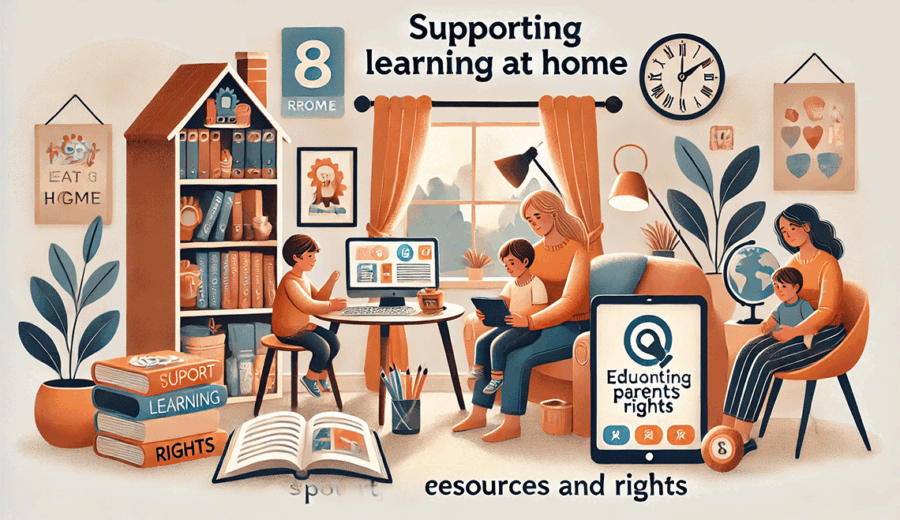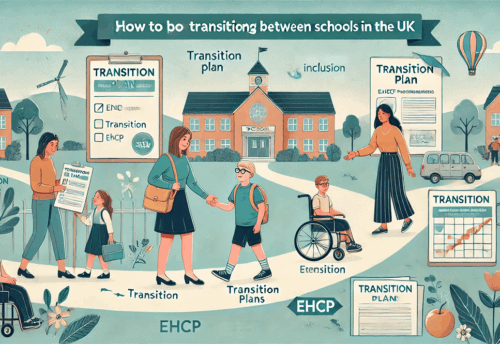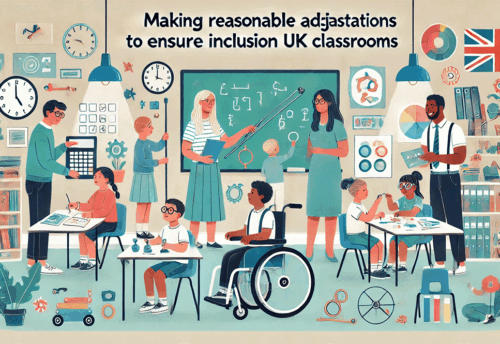
November 27, 2024
Resources and Rights for UK Parents
Supporting Learning at Home: Resources and Rights for UK Parents
Supporting a child’s learning at home is a critical part of their development, especially for children with additional needs. Parents in the UK have access to various resources and legal rights to ensure effective home education. Here’s a detailed guide:
1. The Importance of Home Learning
1.1 Benefits of Learning at Home
- Reinforces school learning and bridges gaps.
- Encourages skill development tailored to the child’s pace.
- Provides a safe, familiar environment for focused learning.
1.2 Home Learning for SEND Children
- Allows flexibility to cater to specific needs.
- Enhances sensory and therapeutic activities.
2. Resources for Home Learning
2.1 Educational Tools and Apps
- BBC Bitesize: Free online resources for all key stages.
- Twinkl: Printable resources, activity packs, and lesson plans.
- Khan Academy: Free online lessons across subjects.
- Assistive Technology: Apps like Proloquo2Go for communication or speech therapy.
2.2 Specialized Resources for SEND
- Widgit: Visual aids and symbol-based learning materials.
- Sensory Learning Kits: Tools like tactile toys or sensory bins for engagement.
- Communication Apps: Tools such as Snap Core First for non-verbal learners.
2.3 Libraries and Community Resources
- Many local libraries provide free access to educational tools.
- Community centers often run workshops or lending programs for resources.
3. Creating an Effective Learning Environment
3.1 Setting Up the Space
- Designate a quiet, clutter-free area for study.
- Use ergonomic furniture and good lighting.
- Include sensory items if needed, such as fidget toys or weighted blankets.
3.2 Structuring the Day
- Establish a consistent routine with set times for learning, breaks, and activities.
- Use visual schedules for children who benefit from structured predictability.
3.3 Parental Involvement
- Actively participate in activities to reinforce concepts.
- Celebrate achievements to boost motivation and confidence.
4. Legal Rights for Parents
4.1 Right to Home Educate
- Parents in the UK can choose to home-educate their child under the Education Act 1996.
- No formal qualifications are required to teach at home.
4.2 Access to EHCPs
- For SEND children, Education, Health, and Care Plans (EHCPs) continue to apply, even in home education.
- Local authorities must ensure provisions outlined in the EHCP are met.
4.3 Support from Local Authorities
- Families have the right to request resources or financial support for home learning.
- Local Offer websites provide guidance on available resources.
4.4 Access to Examinations
- Parents can arrange for their children to take GCSEs, A-levels, or equivalent qualifications as private candidates.
5. Collaborating with Schools
5.1 Supplementing School Learning
- Maintain communication with teachers to align home activities with school curricula.
- Use homework or school-provided resources as a foundation.
5.2 Transitioning Between Settings
- For part-time home learning, ensure a smooth collaboration between school and home schedules.
6. Overcoming Challenges
6.1 Lack of Time
- Focus on quality over quantity; short, consistent sessions are effective.
- Integrate learning into daily activities (e.g., cooking for math or reading during chores).
6.2 Limited Resources
- Use free online platforms and community programs.
- Request support from local SEND services or charities.
6.3 Maintaining Engagement
- Alternate between structured lessons and creative activities.
- Use reward systems or gamified apps to sustain interest.
7. Support for Parents
7.1 Workshops and Training
- Local authorities and charities offer training on teaching strategies and tools.
- Parent groups provide insights and shared resources.
7.2 Emotional Support
- Join support networks for families with similar challenges.
- Access counseling or mental health resources for self-care.
8. Building Life Skills Alongside Academics
- Use everyday activities to teach essential life skills:
- Cooking: Teaches math, reading, and motor skills.
- Gardening: Encourages science exploration and responsibility.
- Household Tasks: Builds independence and routine.
9. Monitoring Progress
- Use checklists or apps to track milestones and achievements.
- Schedule regular reviews with professionals, especially for SEND children.





Leave a Reply